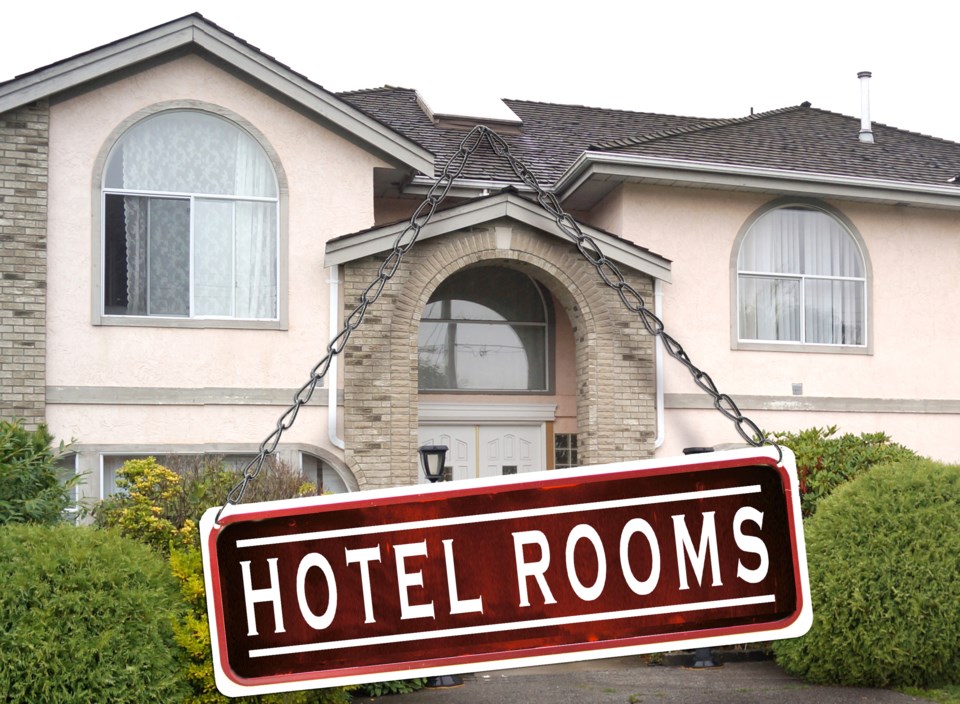Following a series of back and forth reports over the past three months, Richmond city council has approved recommendations from its licensing department “to address concerns related to illegal, hotel-like operations and other negative impacts on neighbourhoods,” according to a news release
There will not be a complete ban on short-term rentals. Rather, the City of Richmond will restrict the number of newly licensed bed and breakfasts across the municipality and every residential dwelling, save for secondary suites and coach houses, will be allowed to rent a bedroom, or two, to up to two people, on a daily basis.
The ultimate goal is to end the use of houses operating as commercial hotels.
The city is temporarily increasing the number of inspectors to address suspected house-hotel operations and other short-term rentals that skirt existing bylaws, which have been described by some councillors as full of loopholes and devoid of enforceable measures.
“The new amendments to address short-term rentals will enable us to respond to neighbourhood concerns from our residents and encourage longer-term rentals,” said Mayor Malcolm Brodie.
“With these amendments, we have a measured approach to protect our neighbourhoods with clear, enforceable requirements.”
Key to the changes, will be the fact that a short-term “operator” must reside in the home. Furthermore, a licensed bed and breakfast operator must be the owner of the house and “live in the home full-time.”
Licences may not be issued to homes that are owned by corporations.
“The short-term rental of entire dwelling units (single-family homes or multi-family units) for 30 days or less is prohibited,” noted the city.
However, the door remains open for those living in one-bedroom condos, who wish to rent a couch, or their bedroom, on a daily basis, so long as they live in the home “full-time.”
A bed and breakfast will allow for a city-licensed operator to rent out three bedrooms to up to six people in total, daily.
Meanwhile, a 500-metre buffer between bed and breakfasts will limit the number of licences across the city.
Other actions are to be taken as well: “The regulations will also increase fines and penalties and ‘Agri-tourism’ accommodations in agricultural zones will now require site-specific rezoning. Council has also directed staff to connect with the provincial government to discuss provincial tax laws and options to level the playing field between B&Bs and hotels,” noted the city.
Additionally, licences must comply with building, fire and health regulations, although liability insurance will only be “encouraged.”
Enforcement is said to be a key component of the new regulations.
As it stands today, one may not rent their home to more than two individuals under the city’s “boarding and lodging” rules. As such, it has always been illegal, and will remain illegal to rent (without a bed and breakfast licence) to more than two people — or at least more than two people who pay money.
An entire home can only be rented out for 30 days or longer; anything less would fall under boarding and lodging or B&B regulations.
“As has always been the case, any home occupant/owner or renter can have guests in their home, if non-paying, but would be subject to other city bylaws to ensure these numbers are not disruptive to neighbourhood etc.,” said spokesperson Ted Townsend.
Another scenario that could test bylaw officers is one in which a person lists multiple bedrooms on separate online listings.
To that extent, “the city will be communicating with residents and will continue to work with the chamber of commerce, B&B operators and web-based listing services such as AirBnB and Expedia, to raise awareness about the changes and their impacts on this industry.”
Fines for violations will increase from $250 to $1,000.
The new regulations will come into effect after final adoption of the bylaw amendments, which is expected to take place in late April.



